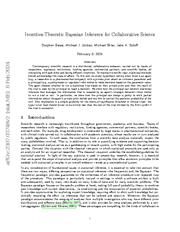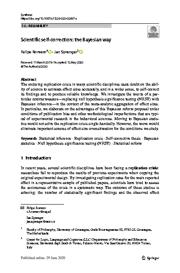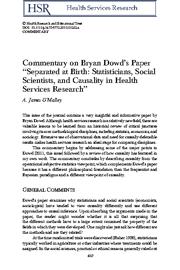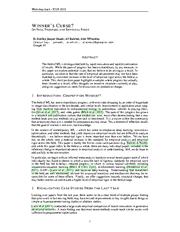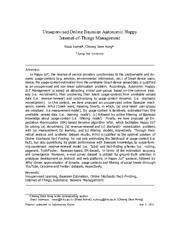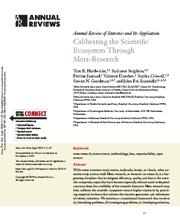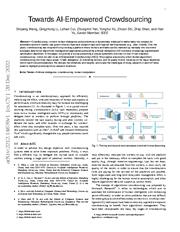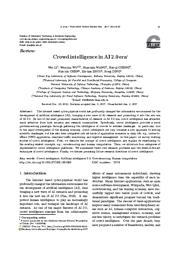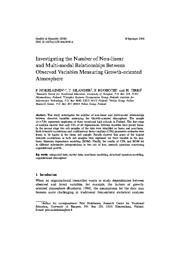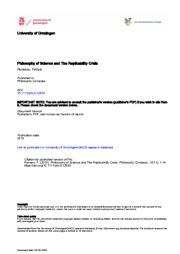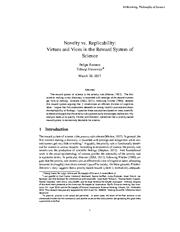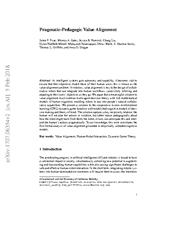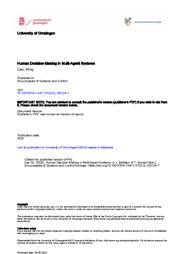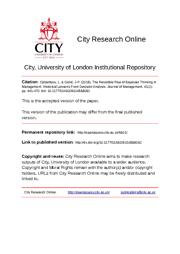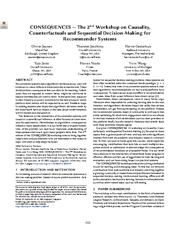A copy of this work was available on the public web and has been preserved in the Wayback Machine. The capture dates from 2024; you can also visit the original URL.
The file type is application/pdf.
Filters
Incentive-Theoretic Bayesian Inference for Collaborative Science
[article]
2024
arXiv
pre-print
interacting with each other and facing different incentives. ...
We show how the principal can conduct statistical inference that leverages the information that is revealed by an agent's strategic behavior -- their choice to run a trial or not. ...
Acknowledgements We thank Jon McAuliffe and Aaditya Ramdas for helpful discussions. ...
arXiv:2307.03748v2
fatcat:otge7kptofd5ho74iuh76vuieq
Scientific self-correction: the Bayesian way
2020
Synthese
behavioral sciences. ...
We investigate the merits of a particular countermeasure-replacing null hypothesis significance testing (NHST) with Bayesian inference-in the context of the meta-analytic aggregation of effect sizes. ...
, ECAP17 in Munich, the Reasoning Club conference in Turin, the "Perspectives on Scientific Error" workshop in Tilburg, and the weekly seminar of the philosophy department of the University of Sydney for ...
doi:10.1007/s11229-020-02697-x
fatcat:oy57ixdhlfgqhkhc535t6kgyea
Commentary on Bryan Dowd's Paper "Separated at Birth: Statisticians, Social Scientists, and Causality in Health Services Research"
2011
Health Services Research
Extensive use of observational data and need for causally defensible results makes health services research an ideal stage for comparing disciplines. ...
commentary concludes by describing causality from the operational subjective statistics viewpoint, which complements Dowd's paper because it has a different philosophical foundation than the frequentist and Bayesian ...
However, a theoretical model (e.g., social science theorem) may be inherent in your asserted opinions about the observable quantities of interest. ...
doi:10.1111/j.1475-6773.2010.01232.x
pmid:21371029
pmcid:PMC3064912
fatcat:klrio6z4pfc43a5365grlpx55i
Winner's Curse? On Pace, Progress, and Empirical Rigor
2018
International Conference on Learning Representations
This short position paper highlights examples where progress has actually been slowed as a result, offers thoughts on incentive structures currently at play, and gives suggestions as seeds for discussions ...
Rikelme et al. (2018) compared a variety of recent approaches for decision making using approximate inference in Bayesian deep neural networks. ...
Incentivizing such collaborations is difficult in a field in which credit assignment is inferred via the low-bandwidth signal of author ordering. ...
dblp:conf/iclr/SculleySWR18
fatcat:ixlieizo45h5zcbwx6qibcnwey
Unsupervised Online Bayesian Autonomic Happy Internet-of-Things Management
[article]
2015
arXiv
pre-print
usage-context is iteratively estimated from the unreliable sensed data (i.e. learning model ), (c) followed by online filtering of Bayesian knowledge about usage-context (i.e. filtering model ). ...
In this context, we have proposed an unsupervised online Bayesian mechanism, namely Whiz (Greek word, meaning Smart), in which, (a) once latent user-groups are initialized (i.e measurement model ), (b) ...
Often estimation theory [16] , collaborative filtering [17] are used for inferring colocation patterns in media content-usage among fellow commuters and predicting bus route or arrival time from the ...
arXiv:1509.06856v1
fatcat:5hlw6bbysrdmpjdlf7m6hp5mcm
Calibrating the Scientific Ecosystem Through Meta-Research
2019
Annual Review of Statistics and Its Application
While some scientists study insects, molecules, brains, or clouds, other scientists study science itself. ...
Please see http://www.annualreviews.org/page/journal/pubdates for revised estimates. ...
There are multiple approaches to statistical inference, including Bayesian and likelihood-based, but frequentist inference is the most prevalent (Chavalarias et al. 2016) . ...
doi:10.1146/annurev-statistics-031219-041104
fatcat:eyl2yaq73fbanokdwpx2mvsilq
Towards AI-Empowered Crowdsourcing
[article]
2023
arXiv
pre-print
Crowdsourcing, in which human intelligence and productivity is dynamically mobilized to tackle tasks too complex for automation alone to handle, has grown to be an important research topic and inspired ...
At the same time, the author investigated the incentive mechanism for the crowdsensing platform with incomplete information on social network effects and proposed an incentive mechanism based on Bayesian ...
The proposed online double auctions incentive mechanism can achieve truthfulness and budget balance by theoretical analysis. ...
arXiv:2212.14676v2
fatcat:2hdfmowyffbuxorhyouipvbqgm
Crowd intelligence in AI 2.0 era
2017
Frontiers of Information Technology & Electronic Engineering
The Internet based cyber-physical world has profoundly changed the information environment for the development of artificial intelligence (AI), bringing a new wave of AI research and promoting it into ...
Then, a Bayesian method based on the EM algorithm was used to infer the confusion matrices and the parameters of the linear classifier. ...
To unify both steps, Wauthier and Jordan (2011) proposed a Bayesian framework under the name of Bayesian bias mitigation. 2. ...
doi:10.1631/fitee.1601859
fatcat:x6aijr7ud5eojjuelaq3sv4v7a
Investigating the Number of Non-linear and Multi-modal Relationships Between Observed Variables Measuring Growth-oriented Atmosphere
2006
Quality & Quantity: International Journal of Methodology
Results showed that some of the highest bivariate correlations in both sub samples were explained via third variable in the nonlinear Bayesian dependence modeling (BDM). ...
The incentive value of the job depends on the opportunities it offers for learning, i.e. developmental challenges, the employees' chances to influence, opportunities to learn collaboratively and the dignity ...
inferences to be generally more reliable. ...
doi:10.1007/s11135-006-9030-x
fatcat:benlgalqgzbxrjjo336duwpgja
Philosophy of science and the replicability crisis
2019
Philosophy Compass
For philosophers, the crisis should not be taken as bad news but as an opportunity to do work on several fronts, including conceptual analysis, history and philosophy of science, research ethics, and social ...
Replicability is widely taken to ground the epistemic authority of science. ...
The argument for Bayesian inference is foundational. ...
doi:10.1111/phc3.12633
fatcat:k4wfxqf4wraohfflybmgcprlge
Novelty versus Replicability: Virtues and Vices in the Reward System of Science
2017
Philosophy of Science
My analysis leads us to qualify Kitcher and Strevens' contention that a priority-based reward system is normatively desirable for science. ...
The reward system of science is the priority rule (Merton, 1957) . The first scientist making a new discovery is rewarded with prestige while second runners get little or nothing. ...
Kitcher uses a formal decision-theoretic model to show that the reward system of science solves this problem. ...
doi:10.1086/694005
fatcat:t2ego5grnzaapgtaxr7tvcs2w4
Pragmatic-Pedagogic Value Alignment
[article]
2018
arXiv
pre-print
In robotics, value alignment is key to the design of collaborative robots that can integrate into human workflows, successfully inferring and adapting to their users' objectives as they go. ...
We argue that a meaningful solution to value alignment must combine multi-agent decision theory with rich mathematical models of human cognition, enabling robots to tap into people's natural collaborative ...
In order to contribute to the objective, R will need to make inferences about θ from the actions of H (an Inverse Reinforcement Learning (IRL) problem), and H will have an incentive to behave informatively ...
arXiv:1707.06354v2
fatcat:7swgocx7mjdkndep74ckg6kmra
Human Decision-Making in Multi-agent Systems
[chapter]
2021
Encyclopedia of Systems and Control
avoid suboptimal collective behaviors and resolve social dilemmas, researchers have tried to understand how humans make decisions when interacting with other humans or smart machines and carried out theoretical ...
of the beliefs or preference values of different options using new observed inputs through Bayesian inference. ...
(iv) Availability for control: Some agents may not be available to be controlled directly, and even for those who are, the control is usually in the form of incentives that may only take effect in the ...
doi:10.1007/978-3-030-44184-5_100124
fatcat:7v3a3omswvcz5ala7d2uvz3ura
The Resistible Rise of Bayesian Thinking in Management
2014
Journal of Management
Relying on concepts from the Science, Technology and Society field of study, and Actor-Network Theory, we approach the production of scientific knowledge as a cultural, practical and material affair. ...
in past and current attempts at importing Bayesianism. ...
Acknowledgments Because the paper is an equal collaboration, the order of authorship is alphabetical." ...
doi:10.1177/0149206314558092
fatcat:pfskzxjjhvbwjoaliiwb762qv4
CONSEQUENCES — The 2nd Workshop on Causality, Counterfactuals and Sequential Decision-Making for Recommender Systems
2023
Proceedings of the 17th ACM Conference on Recommender Systems
At the same time, exposure is often linked to economic incentives for the item producer, which platform-level metrics will be impacted by as well. ...
The literature on the intersection of recommender systems, and causal or counterfactual inference, is often focused on short-term, user-focused metrics. ...
She works in the fields of Bayesian statistics, machine learning, and causal infer- ence. ...
doi:10.1145/3604915.3608749
fatcat:3kx7yv677rh6jbi6qwh3r4eihu
« Previous
Showing results 1 — 15 out of 3,467 results

